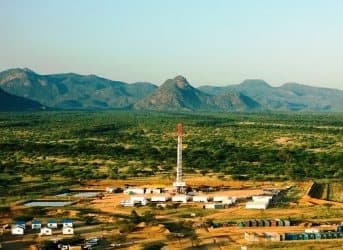Major international oil companies are taking a close look at the offshore oil potential in East African states. London-listed explorer Tullow Oil said it was interested in fast-tracking its developments in Kenya and Italian energy company Eni announced recently it signed three production sharing contracts awarded by the Kenyan government. Tullow said it envisions a potential export pipeline to service the region from neighbouring Uganda. With Kenya serving as a key negotiator in regional issues, including nearby South Sudan, frontier developments in the region may be more than a matter of exploration success.
Kenya has no proven oil reserves though that may change given the pace at which Tullow expects developments to move forward. The company said it expected Kenya to overshadow the 2.5 billion barrels it imagines in nearby Uganda. With the success of its Ngamia-1 well, Tullow said there could be as much as 10 billion barrels of oil situated in its Kenyan acreage. Considering the optimism expressed over the Lake Albert region in Uganda, and given Tullow's proven track record in frontier developments, Kenya could emerge as a major player in the African energy sector.
The Central Intelligence Agency notes that Kenya played a key role in negotiations that eventually led to South Sudan declaring independence last July. South Sudan in January halted oil production in response to alleged pilfering of oil shipments by the rival Sudanese government. South Sudan, through independence, gained control over most of the oil fields, though Sudan maintains control over export options. Both sides early this year were pushed to the brink of war following disputes over the Heglig oil field situated along the ill-defined border separating the two countries. Kenya, apart from the Sudanese conflict, has played an effective role in helping the interim government in Somalia make advances against al-Shabaab and hosts the hundreds of thousands of refugees fleeing ongoing conflict involving Uganda rebel group, the Lord's Resistance Army. That, in part, makes for an attractive investment climate.
The GDP of Kenya in 2011 had a projected growth rate of 4.3 percent, according to the CIA's assessment. By comparison, the collective real growth rate for GDP in the European Union last year was 1.6 percent. That may, in part, explain why it's not just risk-tolerant companies like Tullow are taking a hard look at Kenya. Italian energy company Eni last week announced it signed three production sharing contracts awarded by the Kenyan government for deep and ultra-deep waters off the coast of Kenya. All this from a country that, as of yet, has no proven oil reserves.
Tullow said an export pipeline from Uganda could cross Kenya. Presumably, that link could tie in to fields in South Sudan given that lack of export infrastructure there. With Asian economies looking to secure more reliable sources of oil, it may be Kenya that sparks the economic spill-over effect needed to encourage East African development.
By. Daniel Graeber of Oilprice.com
For the latest oil prices visit our homepage.


















